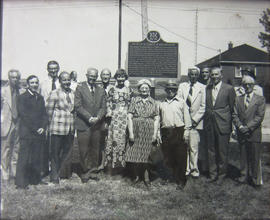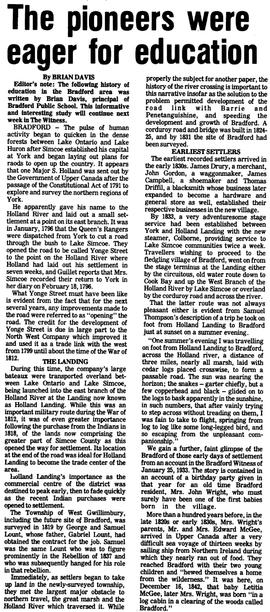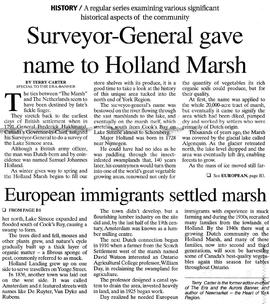Transcription : Governor Simcoe's Papers
(The most interesting parts of the Simcoe Papers were mimeographed for Hon. Leslie Frost, who presented a copy to rev. Gordon Elliott of Schomberg. The latter lent his copy to Mrs. J.A.S. Mills for recopying. A preamble not is signed -- Endorsed: York, Upper Canada, 23 Stptr., 1793, Lieut. Govr. Simcoe. R 22 Decr.)
To those interested, copies of the story of Governor Simcoe's travels in this section of the province, are rare and, having been fortunate in obtaining one, as previously explained, we hope to give it to readers from time to time. If clippings are cut and kept, other may have the complete story.
Diary of Lieut. Governor Simcoe's Journey from Humber Bay Sheriff of the Home District (2)
1793, September 24th -- Lieutenant Pilkington of the R.E. Lieutenant Darling of the 5th Regiment, Lieutenant Givens of the Queen's Rangers; and A. Aitken, D.P.S., with two Lake La Claie (3) and two Matchetache Bay Indians, embarked in a batteau and went that night to Mr. St. John's on the River Humber.
25th -- Got up at daybreak to prepare matters for our journey. His Excellency, Lieutenant Governor Simcoe, joined us from York. We shortly afterwards were ready and entered the woods, keeping our course about N.N.W., crossed a long pine ridge. About one o'clock dined upon a small river which empties itself into the Humber, and, to make the loads lighter, took the bones of of the pork. After dinner, re-loaded our horses and pursued our journey. About four o'clock, it beginning to rain, we encamped on the side of the Humber, at the west extremity of the 3rd concession. We here got some wild grapes and a quantity of crawfish.
26th -- At eight o'clock continued our journey. In the early part of the day, went over a pine ridge; but from ten to six in the evening, when we encamped, went through excellent land for grain or grass, the trees uncommonly large and tall, especially the pine. Crossed two small creeks which emptied themselves into the Humber, on one of which (drunken Creek) we dined, and encamped on the second. The land through which we passed is chiefly wooded with maple, bass, beech, pine and cedar. During this day's march we passed the encampment of an Indian trader, who was on his way to his wintering ground on Lake La Claie.
27th -- Proceeded on early in the morning. Shortly after leaving our fires went through a ridge of very find pine, which appeared to be bounded by a deep ravine to the north. After crossing in an oblique direction the pine ridge, went over excellent land, black, rich mould; timber, maple, beech, black birch and bass. Crossed a ravine and ascended a small eminence of indifferent land. This height terminated in a point, and a gradual descent to the River Humber, which we crossed. We dined here, and remained two hours to refresh ourselves and horses. While at dinner, two men with two horses, who left the end of the carrying place in the morning, met us. They were going to bring forward the trader which we passed the preceeding day, and his goods. After dinner proceeded on. Went over very uneven ground, the soil in some places indifferent, but in general not band land. Saw some very fine yellow pine and birch. About six o'clock came to the end (5) of the carrying place and encamped. Here found Mr. Culbertson (6), Indian trader, and owner of the hut we passed the day before, encamped.
28th -- After breakfast, Messrs. Given and Aitken, with two Indians and two white men, went up the river (7) for three canoes which has been previously provided for the Governor, and I went with three Rangers to erect a stage near the river to put the pork, &c. on, when brought down from the encampment. Having accomplished this, upon our return we cut a few trees to make a bridge upon a bad pass in the swamp. Returned to camp about two o'clock, and shortly afterwards to the stage with seven of the Rangers, all with packs which we put upon the stage. We here met Messrs. Givens and Aitken, having returned with the canoes. The whole then returned to camp only me, who remained to take care of the baggage. In about two hours the whole came down, and we immediately embarked into five canoes, vis. the Governor, Mr. Aitken, an Indian and two Rangers in one; Messrs. Pilkington and Darling with their two servants in the second; Mrs. Givens and two Indians in a third; and an Indian and two Rangers with me in the fourth; and Mr. Aitken's surveying party in the fifth. We dragged our canoes till we came to the river over a part of the swamp where it would be impossible to walk without their support., it being a quagmire, the skin or surface of which was very thin. Proceeded about a mile and a half or two miles along the river, which in this short distance has several turns. Went about a quarter of a mile up a smaller river (8) which empties itself into the former and encamped. Soon after making our fires the Great Sail (9) and his family, (Messassagues), who were encamped further up the river, came to visit their Great Father, the Governor, to whom they presented a pair of ducks, some beaver's meat, and a beaver's tail. The Governor gave them some rum and tobacco.
29th -- Embarked into our canoes in the same manner as the preceeding day, paddled down the river, which is dead water, bordered on each side with quagmires, similar to the one we hauled our canoes over. Abotu two hours after leaving camp, Mr. Givens came into my canoe and the Indian went into his; but our canoe made much water and we could not keep up with the others, we shortly after got the Indian back again. At twenty minutes after one we entered Lake La Claie, now called Lake Simcoe, so called in memory of Captain Simcoe of the R.N. At the entrance of the Lake, we saw two canoes, who upon seeing us paddled off to their village, which was upon a point (10) about four miles off, to apprise them of the Governor's arrival. We paddled on towards the point and passed the village close in shore. The Indians, who were by this time assembled, fired a few de joie to compliment His Excellency, which we answered with three cheers, and then doubled the point, and put in shore in a small sandy bay to dine. Soon after our landing the Indians came in a body to wait on the Governor, to whom they presented a beaver blanket, which he declined taking then, but promised to take it upon his return from Matchetache Bay. They were all more or less drunk and made rather an unintelligible speech. They got liquor from four Canadians who had been sent from Matchetache Bay by Cowan, an Indian trader, to buy corn. His Excellency was sorry that he could not see Keenees, the chief of the village, with whom he was acquainted, as he was dangerously ill. We left our smallest canoe here, and got one Indian in lieu of the two Indians belonging to the village, who preferred remaining to proceeding on the journey. After dinner we re-embarked, and the wind being fair, hoisted sail, and about dark put in shore and encamped in a cedar grove about six miles from the village (11).
30th -- Left our encampment about ten o'clock. Mr. Givens was taken into the Governor's canoe, and in his place on of the Rangers put into mine. Sailed on with a strong breeze about six miles, and it blowing too fresh to cross Kempenfelt Bay, put in at Point Endeavour (12), where we remained till two o'clock and dined. After dinner, the wind moderating a little, we again hoisted sail and crossed the bay, which is between seven and eight miles deep and four or five wide. We had scarcely got over when the wind blew hard ahead, and it beginning to rain we encamped in a pleasant spot (13) on the side of the lake.
Reference Guide:--
(2) Alexander Macdonnell, 1762-1842, the author of this diary was born at Fort Augustus in Scotland and came to New York with his father in 1772, served a volunteer under Sir John Johnson at the seige of Fort Schuyler and the battle of Oriskany, 1777; ensign in 84th Regt., 1778-9; exchanged into Butler's rangers as lieut. 1780-4; sheriff of Home District, 1792-1805; member of Assembly for the Counties of Glengarry and Prescott, 1800-12; Speaker, 1805-08; agent for Lord Selkirk at Baldoon, 1805-12; Deputy Paymaster General of Militia, 1812-13; prisoner of war at Fort George, 27 May, 1813; Superintendent of Settlements, 1815-16; Assistant Secretary of Indian Affairs, 1816; member of the Legislative Council for Upper Canada.
(3) Afterward Lake Simcoe
(4) St. John Rousseau, trader, who had an establishment at Baby Point on the Humber River.
(5) On the west branch of the Holland River, near Kettleby, Ont.
(6) Elsewhere written Culbertson. He was a Scottish fur trader who lived in Kingston for many years.
(7) The Holland River (West Branch)
(8) On the North Branch of the Holland River. The position of Great Sail's encampment, half a mile father up the same stream, has been well known locally, being on Lot 7, Concession 3 of West Gwillimbury Township, about three-quarters of a mile up the branch from the main river.
(9) His descendants have been well known as the Big Sail family of Snake Island. In the version of this Diary printed in the Trans. Can. Inst., Series IV, I. 128-139, the name is given incorrectly throughout.
(10) Since known as De Grassi Point.
(11) On the Innisfil shore opposite Fox Island
(12) Named Bi Bay Point since settlement.
(13) An Indian landing place at a cove on the Oro shore.
(To Be Continued)




